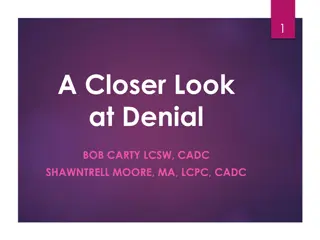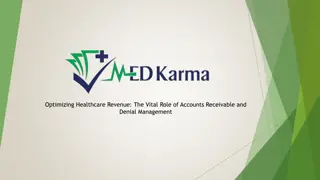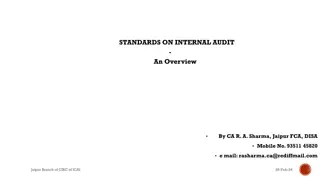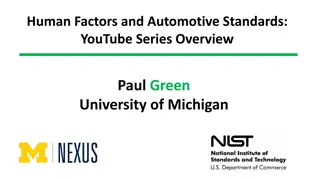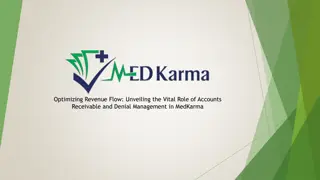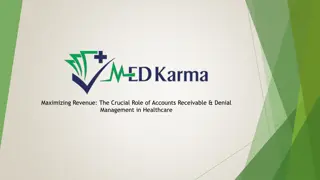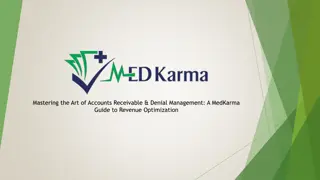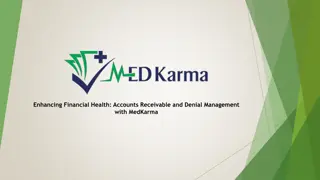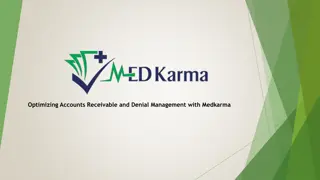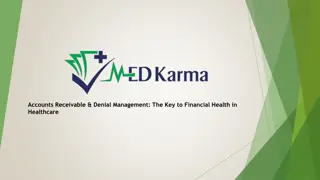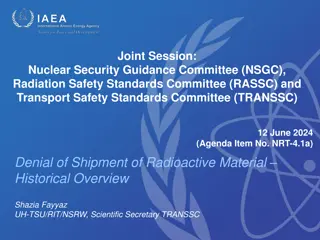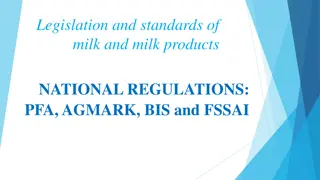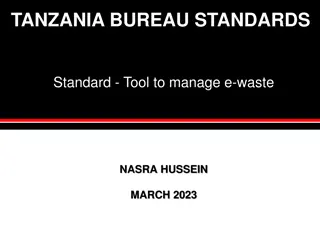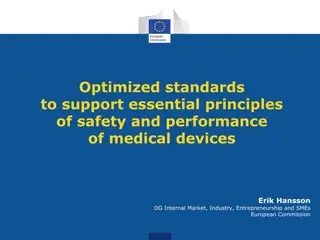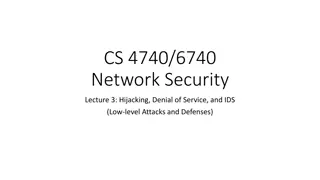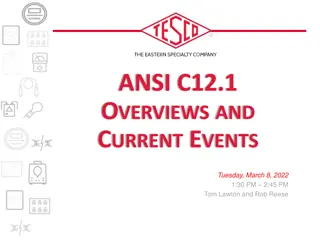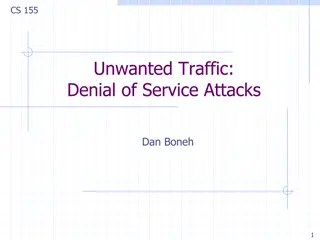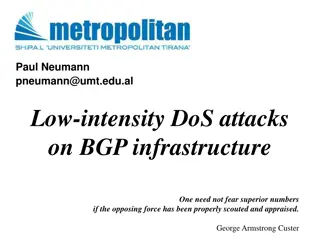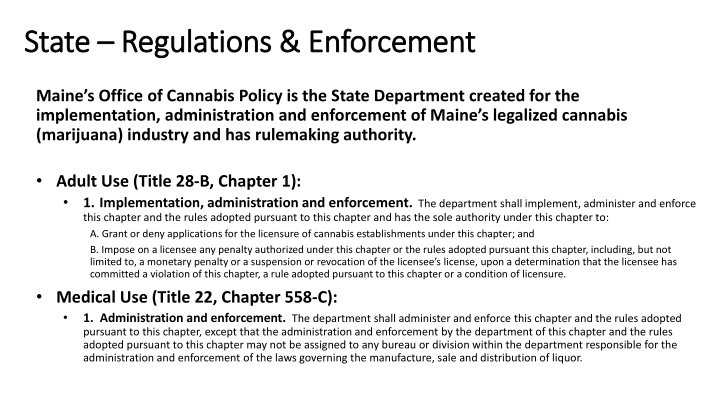
Maine Cannabis Laws and Regulations Overview
"Explore the regulations enforced by Maine's Office of Cannabis Policy for both medical and adult use cannabis industries. Learn about the local licensing requirements, land use approvals, and the process to obtain a business license. Discover the standards for denial of licenses under Chapter 14 of Maine's cannabis regulations."
Download Presentation

Please find below an Image/Link to download the presentation.
The content on the website is provided AS IS for your information and personal use only. It may not be sold, licensed, or shared on other websites without obtaining consent from the author. If you encounter any issues during the download, it is possible that the publisher has removed the file from their server.
You are allowed to download the files provided on this website for personal or commercial use, subject to the condition that they are used lawfully. All files are the property of their respective owners.
The content on the website is provided AS IS for your information and personal use only. It may not be sold, licensed, or shared on other websites without obtaining consent from the author.
E N D
Presentation Transcript
State State Regulations & Enforcement Regulations & Enforcement Maine s Office of Cannabis Policy is the State Department created for the implementation, administration and enforcement of Maine s legalized cannabis (marijuana) industry and has rulemaking authority. Adult Use (Title 28-B, Chapter 1): 1. Implementation, administration and enforcement. The department shall implement, administer and enforce this chapter and the rules adopted pursuant to this chapter and has the sole authority under this chapter to: A. Grant or deny applications for the licensure of cannabis establishments under this chapter; and B. Impose on a licensee any penalty authorized under this chapter or the rules adopted pursuant this chapter, including, but not limited to, a monetary penalty or a suspension or revocation of the licensee s license, upon a determination that the licensee has committed a violation of this chapter, a rule adopted pursuant to this chapter or a condition of licensure. Medical Use (Title 22, Chapter 558-C): 1. Administration and enforcement. The department shall administer and enforce this chapter and the rules adopted pursuant to this chapter, except that the administration and enforcement by the department of this chapter and the rules adopted pursuant to this chapter may not be assigned to any bureau or division within the department responsible for the administration and enforcement of the laws governing the manufacture, sale and distribution of liquor.
Local Local Regulations & Enforcement Regulations & Enforcement For both Medical and Adult Use cannabis retail, testing, manufacturing, and cultivation facilities, the municipality has authority to set and enforce local licensing and land use requirements. Local State
Process to Obtain Business License Process to Obtain Business License Local Land Use/Code Enforcement Approvals Zoning & Permits Planning Board Approval State Requirements - Medical Caregiver Card and/or Conditional License (Adult Use) Local Licensing requires proof of Land Use Approval and State Requirements City Council Approval For Medical establishments, may operate as soon as CO is issued. For Adult Use establishments, local authorization form is signed off and returned to State; State begins the process for Active Licensure; once State active license is granted (requiring CO), local license is issued and may operate.
Chapter Chapter 14 Sec. 14-8 (General) Sec. 14-781 (Cannabis/Marijuana Specific) 14 - - Standards for Denial Standards for Denial Sec. 14-781. Denial, Suspension or Revocation of License. In addition to the provisions set forth in Sec. 14-8 of this Chapter, the following applies: (a) A Local License under this Article shall be denied to the following persons: (1) A person who fails to meet the requirements of this Article. Where an Applicant is an entity rather than a natural person, all natural persons with an ownership interest shall meet these requirements. (2) A person who has had a license for a Marijuana Establishment and/or medical Marijuana Establishment revoked by the City or by the State. (3) An Applicant who has not acquired all necessary State approvals and other required local approvals prior to the issuance of a Local License. (b) The City may suspend or revoke a license for any violation of this Chapter, Chapter 27 or any other applicable building and life safety code requirements. The City may suspend or revoke a license if the licensee has a State License for a Marijuana Establishment and/or Medical Marijuana Establishment suspended or revoked by the State. The Licensee shall be entitled to notice and a hearing prior to any suspension or revocation. (c) If a Local License for a location is finally adjudicated as revoked, any subsequent applicant for a Local License for that location must comply with the then-current requirements of Chapter 27 of the Code of Ordinances, including seeking and obtaining Planning Board site plan approval for the marijuana use at that location.
State Law State Law Title 28 The department (OCP), for good cause, may deny an application for an initial license, a license renewal, a transfer of ownership interests or a relocation of licensed premises. Title 28- -B & Title 22, Chapter 558 B & Title 22, Chapter 558- -C C Adult Use: Denial for good cause, defined: An applicant or licensee has violated, does not meet or has failed to comply with any of the terms, conditions or provisions of this chapter, the rules adopted pursuant to this chapter or any other applicable state or local law, rule or regulation; An applicant or licensee has failed to comply with any special terms, consent decree or conditions placed upon the previously issued license pursuant to an order of the department or the municipality in which the licensed premises are located Medical: Currently no State license for Medical Use regulated by the State s caregiver program; regulated by authorized conduct and rules.
Labels & Packaging Labels & Packaging
What are the existing standards? What are the existing standards? ADULT USE - PACKAGING BOTH PACKAGING Allowed to contain a statement of compatibility with dietary practices Prepackaged in child-resistant and tamper-evident packaging or placed in child-resistant and tamper- evident packaging with a signifier that the package contains harvested cannabis at the final point of sale Allowed to contain depictions of geometric shapes or cannabis leaves; Prepackaged in opaque packaging or an opaque container or placed in opaque packaging or an opaque container with a signifier that the package contains harvested cannabis at the final point of sale Allowed to contain use of the terms "organic," "organically cultivated" or "organically grown" in accordance with requirements regarding the use of such terms as adopted by rule by the department Packaged in a container with an integral measurement component and child-resistant cap if the cannabis product is a multiservingliquid Packaging must conform to all other applicable requirements and restrictions imposed by rule by the department. ADULT USE LABELS Must contain health and safety warnings, license numbers, batch number, net weight statement, instructions on usage, information on the THC potency, list of ingredients, recommended use date or expiration date, a nutritional fact panel (for edible products) and a universal symbol and identity statement. MEDICAL LABELS If a registered caregiver, dispensary or manufacturing facility affixes a label on the packaging of any harvested cannabis provided to a qualifying patient and that label includes information about contaminants, the cannabinoid profile or potency of the harvested cannabis, the label must be verified by a cannabis testing facility. Reference: Adult Use (Title 28-B, Chapter 1, Subchapter 7) Medical Use (Title 22, Chapter 558-C, 2429-A.)
What is prohibited? What is prohibited? BOTH ADULT & MEDICAL USE Labeled or packaged in violation of a federal trademark law or regulation or in a manner that would cause a reasonable consumer confusion as to whether the harvested cannabis was a trademarked product; Labeled or packaged in a manner that is specifically designed to appeal particularly to a person under 21 years of age Labeled or packaged in a manner that obscures identifying information on the label or uses a false or deceptive label Sold or offered for sale using a label or packaging that depicts a human, animal or fruit Reference: Adult Use (Title 28-B, Chapter 1, Subchapter 7) Medical Use (Title 22, Chapter 558-C, 2429-A.)
Signs, Advertising, and Signs, Advertising, and Marketing Marketing
What are the existing standards? ADULT USE MEDICAL USE BOTH May not involve advertising or marketing that has a high likelihood of reaching persons under 21 years of age or that is specifically designed to appeal particularly to persons under 21 years of age; Involve mass-market advertising or marketing campaigns that have a high likelihood of reaching persons under 21 years of age or that are specifically designed to appeal particularly to persons under 21 years of age; May not be misleading, deceptive or false; May not be placed or otherwise used within 1,000 feet of the property line of a preexisting public or private school, except that, if a municipality by ordinance or other regulation, or, in the case of a town, plantation or township located in the unorganized and deorganized areas, the Maine Land Use Planning Commission, chooses to prohibit the placement or use of signs or advertising by or on behalf of a cannabis establishment at distances greater than or less than 1,000 feet but not less than 500 feet from the property line of a preexisting public or private school, that greater or lesser distance applies Market to any person authorized to possess cannabis plants or harvested cannabis under this chapter and specifically to any adult use or recreational cannabis market within the same sign, advertisement or marketing material. May not violate any other requirement or restriction on signs, advertising and marketing imposed by the department by rule
What is prohibited? ADULT USE MEDICAL USE BOTH A prohibition on health or physical benefit claims in advertising or marketing, including, but not limited to, health or physical benefit claims on the label or packaging of adult use cannabis or an adult use cannabis product A prohibition on health or physical benefit claims in advertising or marketing, including, but not limited to, health or physical benefit claims on the label or packaging of harvested cannabis A prohibition on unsolicited advertising or marketing on the Internet, including, but not limited to, banner advertisements on mass-market websites A prohibition on opt-in advertising or marketing that does not permit an easy and permanent opt-out feature A prohibition on advertising or marketing directed toward location-based devices, including, but not limited to, cellular telephones, unless the marketing is a mobile device application installed on the device by the owner of the device who is 21 years of age or older and includes a permanent and easy opt-out feature A prohibition on advertising or marketing directed toward location-based devices unless such marketing includes a permanent and easy opt-out feature and the owner of the device is 21 years of age or older
Enforcement is Complaint Driven Enforcement is Complaint Driven Office of Cannabis Policy does not preapprove advertising and marketing materials. If noncompliant material is included in the application, they do advise. If noncompliance is noticed at any point in the licensing process, reports can be forwarded to Office of Cannabis Policy for follow up. OCP has provided guidance to program participants regarding advertising & marketing activities and has actively followed up when we have reported concerns to them.
Social Justice, Equity, and Barriers Social Justice, Equity, and Barriers Background checks: There were changes to the criminal history record check requirements of our adult use and medical programs that were enacted by the legislature this spring that went into effect in August 2022, specifically: Changing the definitions of disqualifying drug offenses to change the look back period for such offenses from 10 years to 5 years; and Excluding from the definitions of disqualifying drug offenses those offenses that would be permitted had the person convicted of the offense been operating within Maine s regulated cannabis markets. (An Act To Promote Equity and Increase Opportunities in the Cannabis Industry by Reducing Restrictions Related to Convictions for Drug Offenses and To Replace the Term "Marijuana" with the Term "Cannabis" in the Maine Revised Statutes) The City does not require an additional background check of owners/operators if it has been less than a year from the State s application where a background check is already completed.
Social Justice, Equity, and Barriers Social Justice, Equity, and Barriers 4. Disqualifying drug offense. "Disqualifying drug offense" means a conviction fora violation of a state or federal controlled substance law that is a crime punishable byimprisonment for one year or more. It does not include: A. An offense for which the sentence, including any term of probation, incarceration or supervised release, was completed 105 or more years earlier; or B. An offense that consisted of conduct that would have been permitted under this chapter.; or C. An offense that consisted of conduct that would be authorized under Title 28-B or that, if the person convicted of the offense had been acting under the authority of a license pursuant to Title 28-B, would have been authorized under Title 28-B. Red = New as of August 2022
Fees Fees South Portland is middle of the pack comparing administrative costs of other municipalities (average $4,000 for land use and licensing combined for a retail store) Equity, and figuring out what kinds of equity programs will improve social and Equity, and figuring out what kinds of equity programs will improve social and economic equity within the programs regulated by OCP economic equity within the programs regulated by OCP is an ongoing topic of research and review by the office. They want to hear from anyone with ideas or suggestions regarding policies that make sense for Maine s markets. Maine s regulated Possibly a task for the City s Human Rights Commission Human Rights Commission to explore. Recommendation Recommendation: Any City s license City s license or land use : Any requirements requirements should be in or land use application(s). application(s). should be in local Code local Code of Ordinances if on of Ordinances if on


